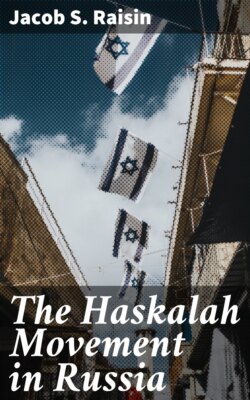Читать книгу The Haskalah Movement in Russia - Jacob S. Raisin - Страница 3
На сайте Литреса книга снята с продажи.
PREFACE
ОглавлениеTable of Contents
To the lover of mankind the history of the Russo-Jewish renaissance is an encouraging and inspiring phenomenon. Seldom has a people made such rapid strides forward as the Russian Jews. From the melancholy regularity that marked their existence a little more than two generations ago, from the darkness of the Middle Ages in which they were steeped until the time of Alexander II, they emerged suddenly into the life and light of the West, and some of the most intrepid devotees of latter-day culture, both in Europe and in America, have come from among them. Destitute of everything that makes for enlightenment, and under the dominion of a Government which sought to extinguish the few rushlights that scattered the shadows around them, they nevertheless snatched victory from defeat, sloughed off medieval superstition, and, disregarding the Dejanira shirt of modern disabilities, compelled their countrymen to admit more than once that
Tho' I've belted you and flayed you,
By the livin' Gawd that made you,
You're a better man than I am!
Similar movements were started in Germany during the latter part of the eighteenth century, and in Austria, notably Galicia, at the beginning of the nineteenth, but none stirred the mind of the Jews to the same degree as the Haskalah movement in Russia during the last fifty years. In the former, the removal of restrictions soon rendered attempts toward self-emancipation unnecessary on the part of Jews, and the few Maskilim among them, satisfied with the present, devoted themselves to investigating and elucidating the past of their people's history. In Russia the past was all but forgotten on account of the immediate duties of the present. The energy and acquisitiveness that made the Jews of happier and more prosperous lands prominent in every sphere of practical life, were directed toward the realm of thought, and the merciless severity with which the Government excluded them from the enjoyment of things material only increased their ardor for things spiritual and intellectual.
In its wide sense Haskalah denotes enlightenment. Those who strove to enlighten their benighted coreligionists or disseminate European culture among them, were called Maskilim. A careful perusal of this work will reveal the exact ideals these terms embody. For Haskalah was not only progressive, it was also aggressive, militant, sometimes destructive. From the days of Mordecai Günzburg to the time of Asher Ginzberg (Ahad Ha-'Am), it changed its tendencies and motives more than once. Levinsohn, "the father of the Maskilim," was satisfied with removing the ban from secular learning; Gordon wished to see his brethren "Jews at home and men abroad"; Smolenskin dreamed of the rehabilitation of Jews in Palestine; and Ahad Ha-'Am hopes for the spiritual regeneration of his beloved people. Others advocated the levelling of all distinctions between Jews and Gentiles, or the upliftment of mankind in general and Russia in particular. To each of them Haskalah implied different ideals, and through each it promulgated diverse doctrines. To trace these varying phases from an indistinct glimmering in the eighteenth century to the glorious effulgence of the beginning of the twentieth, is the main object of this book.
In pursuance of my end, I have paid particular attention to the causes that retarded or accelerated Russo-Jewish cultural advance. As these causes originate in the social, economic, and political status of the Russian Jew, I frequently portray political events as well as the state of knowledge, belief, art, and morals of the periods under consideration. For this reason also I have marked the boundaries of the Haskalah epochs in correspondence to the dates of the reigns of the several czars, though the correspondence is not always exact.
Essays have been published, on some of the topics treated in these pages, by writers in different languages: in Russian, by Bramson, Klausner, and Morgulis; in Hebrew, by Izgur, Katz, and Klausner; in German, by Maimon, Lilienthal, Wengeroff, and Weissberg; in English, by Lilienthal and Wiener; and in French, by Slouschz. The subject as a whole, however, has not been treated. Should this work stimulate further research, I shall feel amply rewarded. Without prejudice and without partiality, by an honest presentation of facts drawn from what I regard as reliable sources, I have tried to unfold the story of the struggle of five millions of human beings for right living and rational thinking, in the hope of throwing light on the ideals and aspirations and the real character of the largely prejudged and misunderstood Russian Jew.
In conclusion, I wish to express my gratitude and indebtedness to those who encouraged me to proceed with my work after some specimens of it had been published in several Jewish periodicals, especially to Doctor Solomon Schechter, Rabbi Max Heller, and Mr. A.S. Freidus, for their courtesy and assistance while the work was being written.
JACOB S. RAISIN.
E. Las Vegas, N. Mex.,
Thanksgiving Day, 1909.
